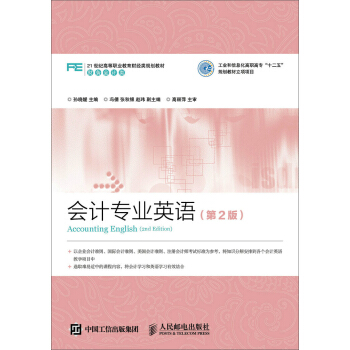会计专业英语(第2版)
¥29.80定价
作者: 孙晓嫒
出版时间:2016-02
出版社:人民邮电出版社
- 人民邮电出版社
- 9787115416452
- 2-5
- 86675
- 64211599-2
- 平装
- 16开
- 2016-02
- 331
- 194
- 管理学
- 工商管理
- F230
- 财务会计
- 高职
作者简介
内容简介
孙晓媛主编的《会计专业英语(财务会计类第2版21世纪高等职业教育财经类规划教材)》充分体现了高等职业教育的特色,理论内容以“必需、够用”为准则,注重培养学生的职业素养,突出实用性。本书主要包括10个教学单元,每个单元均包含学习目标、正文、词汇和课后练习4个部分,所选内容涵盖会计概论,公认会计原则,会计等式与复式记账,会计循环,资产,负债,所有者权益,收入和费用,资产负债表、损益表和现金流量表,财务报表分析等。另外,在书后还附有参考答案和课文参考译文。
本书既可作为高职高专院校财务会计类专业教材,也可作为各类会计从业人员的参考用书。
本书既可作为高职高专院校财务会计类专业教材,也可作为各类会计从业人员的参考用书。
目录
Unit 1 Introduction of Accounting
1.1 The Role of Accounting in Business
1.1.1 The Nature and Function of Accounting
1.1.2 The Division of Accounting
1.2 Accounting Ethics
Important Words and Special Terms
Exercise
Unit 2 Some of Generally Accepted
Accounting Principles
2.1 The Monetary Convention
2.2 Accrual Basis of Accounting
2.2.1 The Cash Basis of
Accounting
2.2.2 The Accrual Basis of Accounting
2.3 Going Concern
2.4 Matching Principle and Revenue Recognition
Important Words and Special Terms
Exercise
Unit 3 Accounting Equation and Double-Entry system
3.1 Accounting equation
3.2 Accounting elements
3.3 Accounting elements in the accounting equation
3.4 T account
3.5 Double-entry System
Important Words and Special Terms
Exercise
Unit 4 Accounting Cycle
4.1 Identify transactions to be recorded
4.2 Journalizing
4.3 Posting from Journal to Ledger
4.4 Preparing Unadjusted Trial Balance
5.4.1 Accounting Basis
5.4.2 Adjusting entries
4.5 The Adjusted Trial Balance
4.6 Closing
Important Words and Special Terms
Exercises
Unit 5 Assets
5.1 Current Asset
5.1.1 Cash
5.1.2 Account Receivable
5.1.3 Inventory
5.2 Fixed Assets
5.2.1 Measuring the cost of Property, Plant and Equipment
5.2.2 Depreciable
5.3 Intangible Assets
Important Words and Special Terms
Exercises
Unit 6 Liabilities
6.1 Current liabilities
6.1.1 Short –term Bills(notes) and Accounts payable
6.1.2 Accrued expenses
6.1.3 Unearned revenues
6.1.4 Current maturities of Long-term debts
6.1.5 Contingent liabilities
7.2 Long-term liabilities
6.2.1 Long-term loans payable
6.2.2 Long-term accounts payable
6.2.3 Bonds (debenture) payable
Important Words and Special Terms
Exercises
Unit 7 Owner’s equity
7.1 Paid-up capital
7.1.1 Ordinary shares(common stock)
7.1.2 Preference shares(preferred stock)
7.2 Retained profits are earned from the customers
Important Words and Special Terms 8
Exercises
Unit 8Revenue,expense,profit
8.1 revenue
8.1.1 The concept of revenue
8.1.2 The characteristics of the revenue
8.1.3 TRADE AND CASH DISCOUNTS
8.1.4 SALES FOR CASH
8.1.5 SALES ON CREDIT
8.2 expense
8.2.1 The concept of expense
8.2.2 The characteristics of the expense
8.2.3 The classification of expense
8.3 profit
8.3.1 The concept of profit
8.3.2 The composition of profit
8.3.3 The formation of the profits
8.3.4 Accounting content of profit distribution
Exercises
Unit 9 Balance Sheet,Income Statement and cash flows Statement
9.1 Balance Sheet
9.1.1 Purpose of Balance Sheet
9.1.2 Format of Balance Sheet
9.1.3 Advantages and Limitation of the Balance Sheet
9.2 Income statement
9.2.1 The function of income statement
9.2.2 Single-step Income Statement
9.2.3 Multiple-step Income Statement
Important Words and Special Terms
9.3 The Role of Cash Flow Statement
9.3.1 Meaning of “Cash Flows”
9.3.2 Importance of Cash Flow Statement
9.4 Categories of Cash Flow
9.4.1 Operating Activities
9.4.2 Investing Activities
9.4.3 Financing Activities
9.4.5 Direct and Indirect
Exercises
Unit 10 Financial statement analysis
10.1 Debt paying ability analysis
10.1.1 Short-term debt paying ability index
10.1.2 Long-term solvency indicators
10.2 Operation capability index analysis
10.2.1 The current assets turnover situation
10.2.2 Fixed assets turnover
10.2.3 The total asset turnover
10.3 Profitability analysis
10.4 case analysis
Exercises
Appendix Ⅰ 参考答案
Appendix Ⅱ 课文参考译文
第1单元 会计概论
第2单元 公认会计原则
第3单元 会计等式和复式记账
第4单元 会计循环
第5单元 资产
第6单元 负债
第7单元 所有者权益
第8单元 收入费用和利润
第9单元 资产负债表和损益表、现金流量表
第10单元 财务报表分析
参考文献
1.1 The Role of Accounting in Business
1.1.1 The Nature and Function of Accounting
1.1.2 The Division of Accounting
1.2 Accounting Ethics
Important Words and Special Terms
Exercise
Unit 2 Some of Generally Accepted
Accounting Principles
2.1 The Monetary Convention
2.2 Accrual Basis of Accounting
2.2.1 The Cash Basis of
Accounting
2.2.2 The Accrual Basis of Accounting
2.3 Going Concern
2.4 Matching Principle and Revenue Recognition
Important Words and Special Terms
Exercise
Unit 3 Accounting Equation and Double-Entry system
3.1 Accounting equation
3.2 Accounting elements
3.3 Accounting elements in the accounting equation
3.4 T account
3.5 Double-entry System
Important Words and Special Terms
Exercise
Unit 4 Accounting Cycle
4.1 Identify transactions to be recorded
4.2 Journalizing
4.3 Posting from Journal to Ledger
4.4 Preparing Unadjusted Trial Balance
5.4.1 Accounting Basis
5.4.2 Adjusting entries
4.5 The Adjusted Trial Balance
4.6 Closing
Important Words and Special Terms
Exercises
Unit 5 Assets
5.1 Current Asset
5.1.1 Cash
5.1.2 Account Receivable
5.1.3 Inventory
5.2 Fixed Assets
5.2.1 Measuring the cost of Property, Plant and Equipment
5.2.2 Depreciable
5.3 Intangible Assets
Important Words and Special Terms
Exercises
Unit 6 Liabilities
6.1 Current liabilities
6.1.1 Short –term Bills(notes) and Accounts payable
6.1.2 Accrued expenses
6.1.3 Unearned revenues
6.1.4 Current maturities of Long-term debts
6.1.5 Contingent liabilities
7.2 Long-term liabilities
6.2.1 Long-term loans payable
6.2.2 Long-term accounts payable
6.2.3 Bonds (debenture) payable
Important Words and Special Terms
Exercises
Unit 7 Owner’s equity
7.1 Paid-up capital
7.1.1 Ordinary shares(common stock)
7.1.2 Preference shares(preferred stock)
7.2 Retained profits are earned from the customers
Important Words and Special Terms 8
Exercises
Unit 8Revenue,expense,profit
8.1 revenue
8.1.1 The concept of revenue
8.1.2 The characteristics of the revenue
8.1.3 TRADE AND CASH DISCOUNTS
8.1.4 SALES FOR CASH
8.1.5 SALES ON CREDIT
8.2 expense
8.2.1 The concept of expense
8.2.2 The characteristics of the expense
8.2.3 The classification of expense
8.3 profit
8.3.1 The concept of profit
8.3.2 The composition of profit
8.3.3 The formation of the profits
8.3.4 Accounting content of profit distribution
Exercises
Unit 9 Balance Sheet,Income Statement and cash flows Statement
9.1 Balance Sheet
9.1.1 Purpose of Balance Sheet
9.1.2 Format of Balance Sheet
9.1.3 Advantages and Limitation of the Balance Sheet
9.2 Income statement
9.2.1 The function of income statement
9.2.2 Single-step Income Statement
9.2.3 Multiple-step Income Statement
Important Words and Special Terms
9.3 The Role of Cash Flow Statement
9.3.1 Meaning of “Cash Flows”
9.3.2 Importance of Cash Flow Statement
9.4 Categories of Cash Flow
9.4.1 Operating Activities
9.4.2 Investing Activities
9.4.3 Financing Activities
9.4.5 Direct and Indirect
Exercises
Unit 10 Financial statement analysis
10.1 Debt paying ability analysis
10.1.1 Short-term debt paying ability index
10.1.2 Long-term solvency indicators
10.2 Operation capability index analysis
10.2.1 The current assets turnover situation
10.2.2 Fixed assets turnover
10.2.3 The total asset turnover
10.3 Profitability analysis
10.4 case analysis
Exercises
Appendix Ⅰ 参考答案
Appendix Ⅱ 课文参考译文
第1单元 会计概论
第2单元 公认会计原则
第3单元 会计等式和复式记账
第4单元 会计循环
第5单元 资产
第6单元 负债
第7单元 所有者权益
第8单元 收入费用和利润
第9单元 资产负债表和损益表、现金流量表
第10单元 财务报表分析
参考文献





